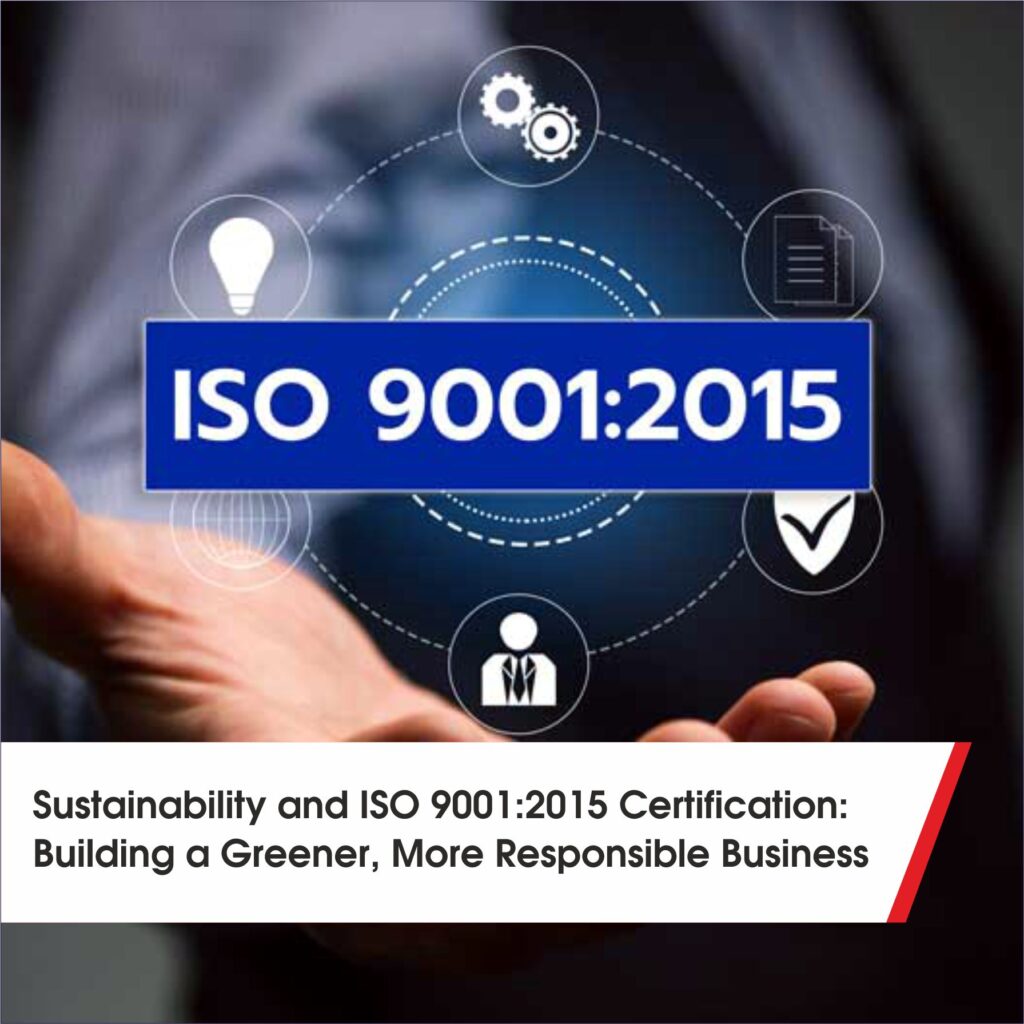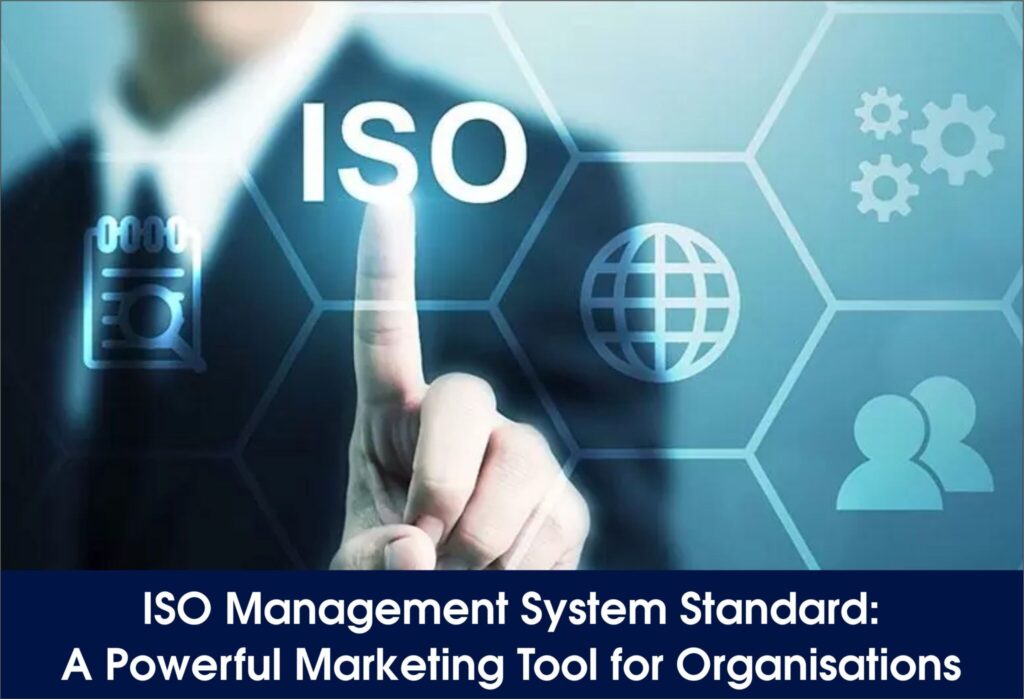Sustainability and ISO 9001:2015 Certification: Building a Greener, More Responsible Business

Sustainability has merged into business practices in today’s age of rapid change. ISO 9001 outlines guidelines for integrating sustainability into business operations. Moreover, it is an international standard for Quality Management Systems QMS). In this blog, we will examine the connection between sustainability and ISO 9001, outlining the actions that companies may take to create organisations that are more ethical and sustainable. What is ISO 9001 Certification? ISO 9001 is a standard for Quality Management System (QMS). The primary focus of the 9001 is enhancing customer satisfaction and operational efficiency. Moreover, it provides a solid foundation for integrating sustainability practices within the organisation. ISO 9001 standard encourages organisations to consider the needs and expectations of all stakeholders, including customers, suppliers, employees, and the wider community. It engages with stakeholders and organisations to identify sustainability initiatives that align with their values and address the concerns of the various parties involved. ISO 9001 emphasizes the significance of establishing sustainability objectives and setting specific goals. It focuses on increasing resource efficiency, waste reduction, carbon footprint reduction, and other environmental and social factors. Integrating ISO 9001 Certification with Sustainability ⮯ ISO 9001 guides integrating sustainability into existing processes. Here are some significant steps for building a greener and more responsible business:- Conducting a Sustainability Assessment: Organisations should assess their current environmental impact and identify areas for improvement. Moreover, this may involve measuring energy consumption, carbon emissions, waste generation, and water usage. By understanding their environmental footprint, businesses can make informed decisions about sustainability targets and initiatives. Developing a SustainabilityPolicy: A sustainability policy outlines the organisation’s commitment to sustainable practices. It should include measurable objectives, targets, and a roadmap for achieving sustainability goals. The organisation must communicate policies with all employees and stakeholders to ensure widespread awareness and participation. Engaging Employees: Employees play a significant role in driving sustainability initiatives. Organisations should provide training on sustainability practices and encourage employee involvement in identifying opportunities for improvement. By engaging employees, businesses can cultivate a culture of sustainability where everyone feels responsible for environmental and social impacts. Supplier Engagement: Organisations should collaborate with suppliers to promote sustainable sourcing and procurement practices. Moreover, this can involve setting sustainability criteria for supplier selection, conducting audits to ensure compliance with environmental standards, and encouraging suppliers to adopt sustainable practices. Monitoring and Measurement: ISO 9001 emphasises the importance of data-driven decision-making. Businesses should establish monitoring systems to track progress towards sustainability goals. Regular audits and performance assessments can help identify areas of improvement. Benefits of Building a Greener Business ⮯ Adopting sustainable practices in line with ISO 9001 brings numerous benefits to organisations. The following are the benefits of integrating ISO 9001 with sustainability:- Increases Reputation: A commitment to sustainability can improve a company’s reputation, attracting environmentally conscious customers and investors who align with the organisation’s values. Cost Savings: Implementing resource-efficient practices can lead to cost savings as it reduces energy consumption, waste generation, and optimised processes. Regulatory Compliance: Many countries have introduced regulations and incentives to encourage sustainability. Organisations can apply for ISO 9001 standards and incorporate sustainability to ensure compliance with relevant laws and regulations. Employee Engagement and Retention: Employees are more likely to be engaged and motivated when working in sustainable organisations. It demonstrates a commitment to sustainability to attract and retain talented individuals. Conclusion ✅ ISO 9001 is a powerful tool for companies seeking to build greener, more responsible businesses to improve their environmental performance. Moreover, by integrating sustainability practices into their quality management systems, organisations can enhance their reputation and contribute to a more sustainable future. Enjoy Reading – What is ISO 9001 Certification Why is ISO 9001 Certification Beneficial for it Companies Non-Conformance in ISO 9001 ISO 9001 2015 Mandatory Documentation List
ISO Management System Standard: A Powerful Marketing Tool for Organisations

Producing quality products or services is not sufficient for an organisation in the current cutthroat business environment. Businesses must stand out from the competition and win over customers’ trust. Organisations can establish trust and credibility with ISO management systems. Moreover, it is one of the persuasive approaches to leverage your business in the market. Organisations can use the ISO (International Organisation for Standardisation) standards as a framework to show their dedication to quality, environmental sustainability, information security, and other issues. Including ISO standards in your marketing plan helps strengthen your brand’s reputation and attract affluent customers. What does it mean to have an ISO certification? ISO certification is an internationally recognised accreditation awarded to organisations that meet specific standards and criteria set by the International Organization for Standardization (ISO). It signifies that an organisation has shown conformity with ISO standards, such as ISO 9001 for quality management or ISO 14001 for environmental management and more. Companies that have received ISO certification show a dedication to upholding international standards, which can improve a business’s standing and competitiveness. Additionally, these certifications boost customer happiness, lower risks, and promote operational efficiency. The standards help individual organisations and their stakeholders while fostering efficiency, uniformity, compliance, and confidence among clients and business partners. It also improves a company’s reputation. Benefits of ISO Certifications ⮯ ISO Certifications offer a goldmine of benefits to organisations and help organisations win new businesses, clients, and customers. The following are the benefits of ISO Certifications :- Building trust and credibility: ISO certifications increase clients’ and customers’ trust and confidence in your products and services. ISO is a hallmark of reliability and credibility; hence, companies use it as a marketing tool to create awareness among customers and clients in the market. ISO standards are demanding and high on dedication to quality and best practices. Competitive advantage: It provides a competitive edge to organisations in the market. The presence of certification demonstrates to clients that you are committed to upholding high standards when they compare your company to others. It might influence someone to pick your goods or services over competitors. ISO Management System Standard (MSS) as an Effective Marketing Tool ⮯ The ISO Management System Standard (MSS) is a marketing tool; based on the effective use of the ISO MSS series, many organisations fail to recognise the significance of consumer perspectives. Use the ISO logo and certification marks: ISO marketing standard systems ensure that your website, product packaging, and marketing materials feature the relevant ISO logos and certification marks. These insignia are easily recognisable and demonstrate your dedication to excellence. Highlight Your Commitment: It encourages organisations to mention in their marketing materials that your company is ISO-certified and what that means for your clients. As an illustration, “We are proud to be ISO 9001 certified, ensuring that our products meet the highest quality standards.” Share Your Story: Sharing your experience of getting ISO certification and the vision behind it enhances customers’ and clients’ trust. Customers value honesty, and knowing how much work has gone into something creates a positive image for the brand. Customer Testimonials: Request testimonials from happy clients that highlight your ISO certificates. It gives assertions to potential partners and clients about your services and quality. Educational Content: Create blog entries, films, or whitepapers with educational content that explains the value of ISO standards in your sector and how your certification benefits clients. Conclusion ✅ The ISO Management System Standard (MSS) is a powerful marketing tool that enhances an organisation’s commitment to quality and excellence. The ISO logo leverages the organisation’s market image, and the certification visually exhibits the organisation’s dedication. It creates a good reputation for organisations as a quality-driven, ISO-certified entity, ultimately benefiting the business and its clients. Enjoy Reading – ISO Certification can Boost your Business Learn More About ISO Registration Non-Conformity Blog On ISO 9001:2015 Steps For Becoming ISO Certified In India
